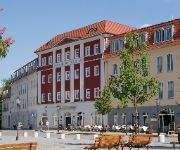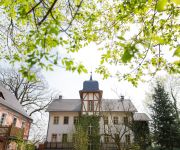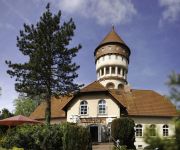Facts and Data
Webpages:
Official Unesco Page
Basis Data:
Unesco World heritage since: 2004
Size of heritage: 348 ha
- Buffer zone: 1,205 ha
Coordinates:
Longitude: 14,726°
Latitude: 51,579°
Summary
A landscaped park of 559.9 ha astride the Neisse River and the border between Poland and Germany, it was created by Prince Hermann von Puckler-Muskau from 1815 to 1844. Blending seamlessly with the surrounding farmed landscape, the park pioneered new approaches to landscape design and influenced the development of landscape architecture in Europe and America. Designed as a ‘painting with plants’, it did not seek to evoke classical landscapes, paradise, or some lost perfection, instead using local plants to enhance the inherent qualities of the existing landscape. This integrated landscape extends into the town of Muskau with green passages that formed urban parks framing areas for development. The town thus became a design component in a utopian landscape. The site also features a reconstructed castle, bridges and an arboretum.
Location on Map
Show bigger map on Openstreetmap
Introduction
Muskauer Park, also known as Park Mużakowski, is a UNESCO World Heritage site located in Germany. It is a unique cultural landscape that spans across the border between Germany and Poland. This article will delve into the history of this heritage site and its current state.
History
Muskauer Park was designed by Prince Hermann von Pückler-Muskau, a renowned landscape architect, in the 19th century. The park was created as an English-style landscape garden, inspired by the works of Capability Brown and Humphry Repton. Prince Pückler-Muskau's vision was to create a harmonious blend of nature and architecture.
The construction of the park began in 1815 and continued for several decades. The park underwent various transformations and expansions under the guidance of Prince Pückler-Muskau. He incorporated elements such as lakes, meadows, forests, and carefully designed paths to create a picturesque landscape.
During the 20th century, the park faced significant challenges due to political changes and World War II. The park was divided between Germany and Poland after the war, with the Neisse River acting as the border. This division resulted in neglect and deterioration of the park.
Current State
Since the fall of the Iron Curtain, efforts have been made to restore and preserve Muskauer Park. In 2004, the park was inscribed as a UNESCO World Heritage site, recognizing its outstanding universal value. The joint management of the park by Germany and Poland has been crucial in its restoration.
Today, Muskauer Park is a stunning example of landscape architecture and a symbol of German-Polish cooperation. The park covers an area of approximately 559 hectares, with 348 hectares in Germany and 211 hectares in Poland. It is a living testament to Prince Pückler-Muskau's vision.
The park features numerous architectural structures, including the iconic Muskauer Castle, which serves as the park's focal point. The castle underwent extensive restoration and now houses a museum dedicated to Prince Pückler-Muskau and the history of the park.
Visitors to Muskauer Park can explore its vast network of paths and trails, which offer breathtaking views of the landscape. The park's design seamlessly integrates natural elements, such as the Neisse River and the Rakotzsee lake, with man-made structures, creating a harmonious and picturesque environment.
Muskauer Park is not only a place of natural beauty but also a site of cultural significance. It serves as a meeting point for people from different backgrounds and promotes cross-border cooperation. The park hosts various cultural events, exhibitions, and concerts throughout the year, attracting visitors from around the world.
Conclusion
Muskauer Park, with its rich history and stunning landscape, is a UNESCO World Heritage site that showcases the genius of Prince Hermann von Pückler-Muskau. Through joint efforts by Germany and Poland, the park has been restored to its former glory. Today, it stands as a symbol of cultural heritage and international cooperation, inviting visitors to immerse themselves in its beauty and tranquility.






